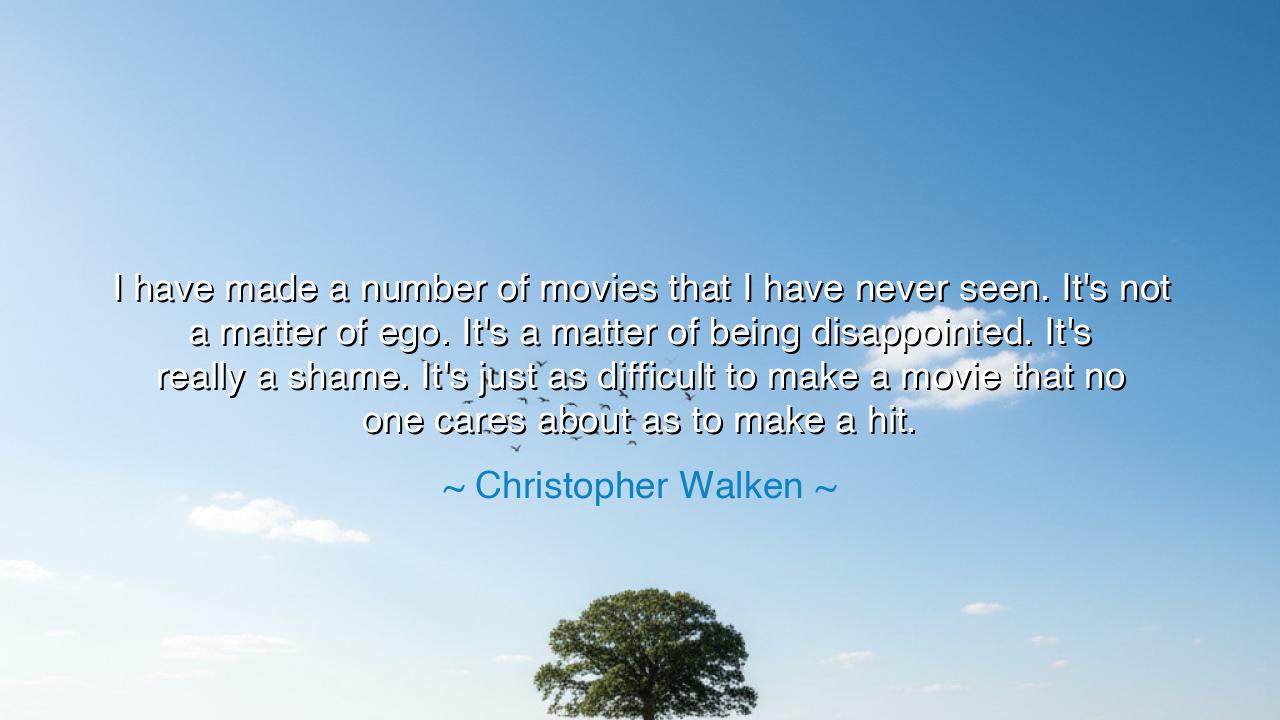
I have made a number of movies that I have never seen. It's not
I have made a number of movies that I have never seen. It's not a matter of ego. It's a matter of being disappointed. It's really a shame. It's just as difficult to make a movie that no one cares about as to make a hit.






Ah, the words of Christopher Walken, whose candid reflection speaks to a profound truth about the creative process and the human condition: "I have made a number of movies that I have never seen. It's not a matter of ego. It's a matter of being disappointed. It's really a shame. It's just as difficult to make a movie that no one cares about as to make a hit." In these words, Walken touches upon the difficulties of creation—not just in making art, but in the absence of recognition, in the disappointment that comes when a piece of work fails to connect with its audience. He reminds us that the struggle of creation is not solely about achieving success, but about the emotional toll it takes when something you have poured your soul into is met with indifference.
In the ancient world, the great artists and philosophers knew well the difficulties of creation—the struggles that came not just in the act of creation, but in the unpredictability of how the world would receive it. Socrates, for example, was not concerned with popularity or fame. His work, filled with questions that challenged the very fabric of Athenian society, was often met with resistance and even disdain. Yet, Socrates continued to teach, understanding that the true value of his work did not depend on the immediate response of others. Similarly, Walken acknowledges that the true challenge of creating lies not in the success but in the failure—in the art that is produced with great effort, only to be ignored or forgotten by those it was meant to touch.
Consider the tragic tale of Vincent van Gogh, whose genius went largely unrecognized during his lifetime. Van Gogh created hundreds of masterpieces, but in his time, his works were dismissed by critics and ignored by the public. His frustration was not born of ego or vanity, but of a deep desire to connect with others through his art. Van Gogh’s story is one of creation driven by passion and purpose, yet met with the disappointment of indifference. In the same way, Walken’s words remind us that creation is a vulnerable act—one that can result in either adulation or rejection, and it is this uncertainty that makes the creative journey both heroic and painful.
The struggle to create meaning in a world that is not always receptive to art is as old as humanity itself. The ancient poets understood that their work was not always guaranteed to be celebrated in their time. Homer, for example, wrote stories that would not gain the recognition they deserved until centuries later. The heroes of his tales, though lauded in their own time, often faced the crushing reality of being misunderstood or forgotten. Yet, Homer’s wisdom lies in his understanding that art is not solely for the purpose of immediate recognition, but for the eternal pursuit of truth and beauty. Walken’s acknowledgment of disappointment speaks to this same struggle—the artist must continue to create not for instant gratification, but for the lasting impact their work may have, even if that impact is not felt in their lifetime.
The lesson in Walken’s words is one of resilience. The artist, whether in theater, film, painting, or any other medium, must be prepared to face the uncertainty of public reception. The process of creation is not just about making something people love, but about making something true—true to the artist’s vision, to their heart, to the deeper truths they wish to express. As Walken points out, it is just as difficult to make something unnoticed as it is to make a hit, and in both cases, the artist must remain committed to their craft. Walken invites us to embrace the disappointments of creation, to see them not as failures, but as integral parts of the journey—steps that teach us to continue, to evolve, and to persist.
Consider the wisdom of the ancient sculptor Phidias, who created the Parthenon sculptures, masterpieces that were celebrated in their time but whose true legacy has grown in the centuries since. Phidias, like many artists, must have faced moments of doubt—his work was challenging, grand, and difficult to conceive. Yet, he continued to carve, not for the immediate applause of the crowd, but for the enduring impact of his art. In this same way, Walken’s journey as an actor in both hit films and those lesser known speaks to the same commitment to craft—a commitment to create, regardless of the outcome, knowing that the true value of art lies not in the immediate reaction, but in the satisfaction of the process itself.
Thus, the call to action is clear: create with integrity, regardless of the outcome. Whether your work is met with applause or indifference, remember that creation is an act of purpose and courage. Like Walken, who continues to work even in the face of disappointment, and like the ancient artists who carved and wrote in pursuit of a greater truth, we too must learn to create not for validation, but for the joy of expression. In doing so, we align ourselves with the eternal pursuit of truth, knowing that the worth of our work is not determined by immediate success, but by the lasting impact it may have, in ways we may never fully understand.






AAdministratorAdministrator
Welcome, honored guests. Please leave a comment, we will respond soon